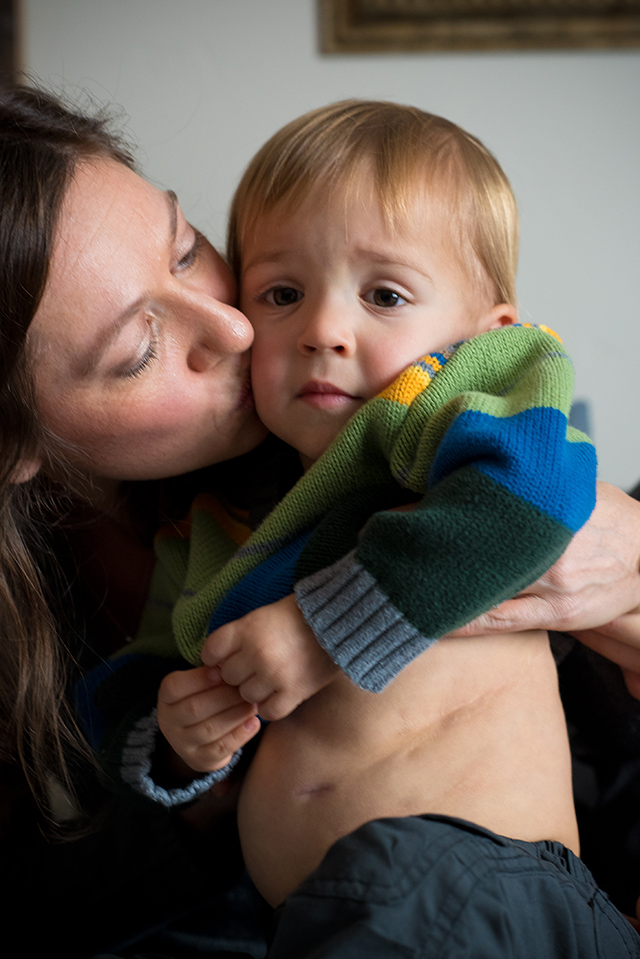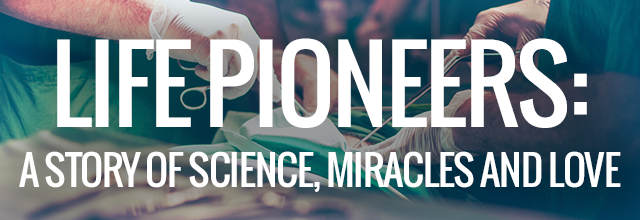When April Leffingwell gave birth to her son, Elijah, they instantly became survivors.
Eight weeks earlier, in a procedure that could have killed them both, doctors partially removed Elijah from April’s womb so surgeons could remove a tumor the size of an orange from the boy’s left lung.
“I was at the lowest point in my life after he was born,” says April Leffingwell of her son, Elijah.
Instead of bringing joy, the occasion of Elijah’s premature birth — and knowing that he had indeed made it through birth — left April depressed and overwhelmed.
“I definitely had postpartum depression,” April says. “It was very hard. I was at the lowest point in my life after he was born.”
Earlier this month, The Daily Signal visited the Leffingwells’ Wisconsin home and told the story of the miraculous surgery that saved Elijah.
If not for prenatal surgery, done before Elijah’s birth to stop the tumor from smothering his heart and right lung, doctors say he would have died.
But as April’s experience with postpartum depression shows, when a mother decides to move forward with fetal surgery, she is not just sacrificing her baby — who faces risks such as premature birth — but also herself.
Experts refer to the mother in this experience as the “innocent bystander,” subjected to a hip-to-hip wound of her abdomen from two surgeries (the fetal surgery and cesarean delivery), a lifetime of scarring, months of bedrest and lost work — and an expectation that she cope with it all.
“It’s a very fine weighing of the balances between maternal risk and fetal risk,” says Dr. Julie Moldenhauer, the medical director of the special delivery unit at the Children’s Hospital of Philadelphia. “Because clearly for the fetus this is a life-or-death situation. And for mom this is a very large commitment.”
Moldenhauer is studying the incidence of postpartum depression with mothers who carry babies with birth defects.
Postpartum depression — maternal mental illness — is not limited to mothers who experience a traumatic pregnancy.
Recent studies show that in the year after giving birth, at least one in eight and as many as one in five women develop symptoms of depression, anxiety, bipolar disorder, obsessive-compulsive disorder or a combination.
In addition, researchers say that symptoms often occur during pregnancy — and not necessarily immediately after giving birth — as commonly thought.
Genes, stress and hormones are considered causes of maternal mental illness, scientists say.
Moldenhauer says her research is too new to say definitively if mothers who carry babies with birth defects are more likely to have postpartum depression than those who have ordinary pregnancies.
But any mother who undergoes a complicated pregnancy is certainly at risk for such mental problems, she says.
“We found that moms with these difficult pregnancies are at higher risk for developing postpartum depression, high anxiety and post traumatic stress disorder,” Moldenhauer says. “Because really, you enter a pregnancy and every couple comes in with high hopes and expectations. Most of the time it is wonderful and fun. And for a small portion of couples, they receive news that there’s an issue. You can only imagine all of the emotions that go along with that and the concern and the worry.”
‘No Escape’
April felt the worst after Elijah was discharged from the hospital.
Elijah was on life support for the first nine days after birth.
He spent the first 66 days of his life at Children’s Hospital of Philadelphia, where he was tended to by nurses and neonatologists, his vitals tracked by monitors.
At home, April and her husband, Jason, finally cared for Elijah on their own.
“The lowest emotionally was when I got home and there are no nurses caring for him,” April says. “There was no escape for me.”
>>> Elijah’s Story: A Life Saved Before Birth
One month after coming home, April resumed full-time work at the financial firm Robert W. Baird.
She used up two months of her three-month maternity leave while Elijah recovered in the neonatal intensive care unit.
“I didn’t have a real maternity leave,” April says.
After work, April and Jason would return to their house to a baby who could not eat on his own.
Because he was born prematurely — and because of complications from fetal surgery — Elijah spent the first year of his life on a feeding tube.

April is always connected with Elijah because of their similarly sized scars from the fetal surgery. (Photo: Scott Eastman)
April and Jason prepared his meals by pouring formula into a continuous feed that attached to his stomach.
“I was overwhelmed,” April says. “It was nonstop. I’d come home from work to a medically fragile baby.”
The couple took Elijah to occupational therapy every other week.
As part of the state-run Birth to Three program, therapists came to the Leffingwells’ home to help with Elijah’s developmental problems, such as eating, sitting, rolling over and pushing up.
Their attention diverted, April and Jason feared that they were neglecting Elijah’s 4-year-old big sister, Ellianna.
“I was so consumed with Elijah that I had no time for my daughter,” April says. “I was guilty for my daughter.”
>>> 46 Touching Photos That Prove Love and Science Work Miracles
April also had no time for herself, so she suffered lingering complications from Elijah’s birth defect.
When Elijah was still inside April’s womb, his tumor crushed his esophagus, preventing it from swallowing amniotic fluid — a slightly yellowish liquid that surrounds an unborn baby during pregnancy.
As a result, the fluid clogged and stretched April’s stomach so big and so fast, that it caused a hernia. So at 25 weeks pregnant, she looked ready to deliver a baby.
April lived with the hernia until July of this year. At that point, while her stomach didn’t appear pregnant, an off-center bulge protruded from her belly.
“It looked like I had put a baseball under my shirt,” April says. “It was not a feminine baby bump.”
When doctors opened her up, they found April actually had a triple hernia, she says.
“Now I am finally breathing,” April says. “I can breathe again. I lived with that trauma for over a year because I didn’t have a moment for myself.”

April, with her children, Elijah and Ellianna, says she can “finally breathe again.” (Photo: Scott Eastman)
Some mothers who experience postpartum depression report having visions and urges to harm their child.
April never reached that point.
“I never felt like I wanted to harm Elijah,” April says. “It was just overwhelming.”
She handled her problems by leaning on Jason.
“He was my rock,” April says. “He never showed much emotion.”
She relied on herself, refusing to see a psychologist or take medication.
April says she’s the type who would rather “sit under a tree or get a massage” than take pills or talk to a shrink, but she still kicks herself for not getting help.
“I know I should have,” April says. “My excuse was, ‘Why should I go? What is the point? So I can just cry to them? They can’t do anything for me.’”
‘No Regrets’
Despite her emotional and physical struggles, April has no regrets about choosing fetal surgery.
That’s because today, 2-year-old Elijah is healthy — and alive.
But it’s also because April respects the process that informed her decision to move forward with fetal surgery.
Medical professionals say they are honest and cautious in deciding whether to recommend fetal surgery.
“No one has all the answers,” says Lori Howell, executive director of the Center for Fetal Diagnosis and Treatment at the Children’s Hospital of Philadelphia. “Our job is to weigh out all the options.”
Howell continues:
“If the decision is made to proceed with fetal surgery, we do that with the reasonable expectation that we think we will get a good baby out of this. If it is a postnatal option, that’s fine with us. We support them in that decision. Because, at the end of day, it’s important they have no regrets about what they decided to do. I always have to remember that we will see another mom the next day, but this family lives with this decision the rest of their lives.”
In April’s case, because Elijah was already suffering from heart failure, doctors presented surgery before birth as the only option that would produce a healthy baby.
Doctors deemed April a good fit for fetal surgery because of her slim figure and clean health record.
She consulted with Joanna Cole, a psychologist at the hospital, in the days before fetal surgery.
The hospital’s Center for Fetal Diagnosis and Treatment staffs a support team consisting of a psychologist, social workers, a chaplain and a child life specialist.
Natalie Rintoul, the neonatologist who cared for Elijah after birth and discharged him from the hospital, says the hospital’s resources help parents make a far-reaching decision.
“It’s not just about surviving,” Rintoul says. “[It’s about] what are they going to be like in kindergarten? What are they going to be like? Parents ask us that. We are all about being honest and telling them everything that we know so they can make the best decisions for the baby and for their family.”
Life Recovery
Now that Elijah and April have survived, they must live.
Once Elijah got off the feeding tube and began eating orally, April says her feeling of hopelessness went away.
She hopes to return to work next year. Her quick recovery from postpartum depression may be a part of a trend, but experts say it’s too early to say.
“We think long term it is an adjustment disorder, and they are able to get back to a normal routine,” Moldenhauer says. “We are trying to establish how frequently do we see this and what is best to support these couples. Because right now, we don’t know. This is an area that’s completely open. We’re doing the best we can.”
Though April’s battle with postpartum depression never reached the worst end of the spectrum, her experience reveals the sensitive balance of fetal surgery.
“You would do anything for your child,” April says. “But it’s stressful.”

























